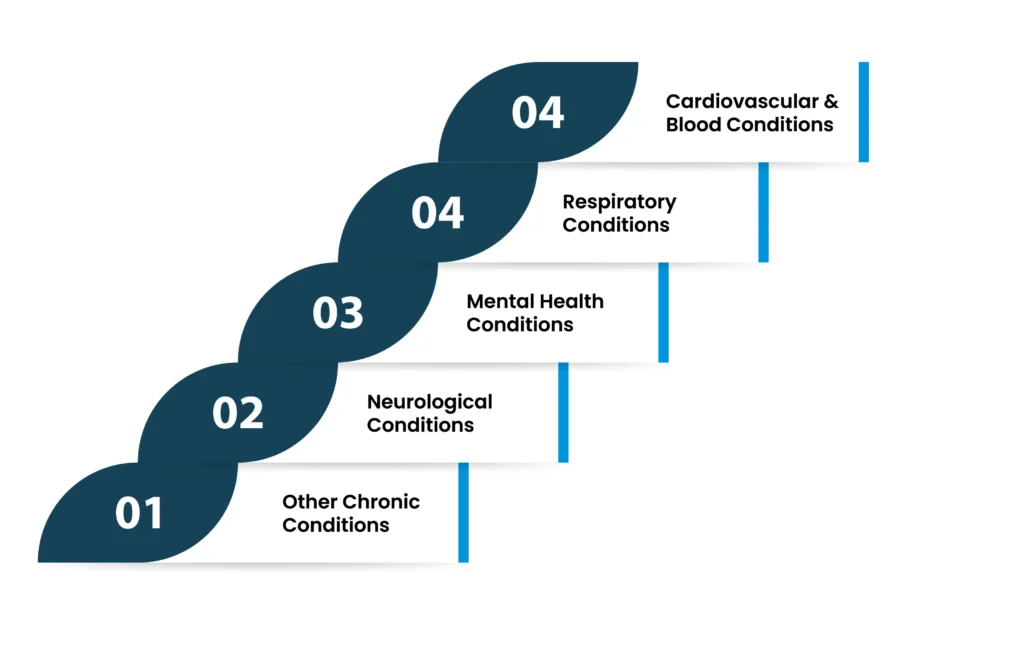
WHAT IS INTEROPERABILITY IN HEALTHCARE?
What Is Interoperability In Healthcare? Electronic health records are considered to be a great advancement in the healthcare field. Early in 1965, they were used

Chronic care management programs are pivotal in managing chronic care conditions. With regular checkups and medication, it led to better healthcare outcomes. However, not all conditions qualify for Chronic Care Management (CCM) services. So if you are wondering whether your chronic condition is eligible for CCM, read on to find out.
In this Blog post we will have an insight on what conditions qualify for Chronic Care Management. We will highlight list of conditions that are eligible for CCM services and the benefits of enrolling in a CCM program.
Before we delve into the conditions that qualify for CCM, let’s first understand what exactly chronic care management is. CCM is a healthcare service designed to help patients with chronic health conditions to manage their care effectively. This program involves the coordination of care between a patient’s primary care provider and other healthcare providers. It aims to improve overall health outcomes by ensuring patients receive the necessary healthcare services and support.
For patients to qualify for CCM services, they are required to have 2 or more chronic care conditions. So, what basically is a chronic care condition?
A chronic care condition can qualify the definition of a chronic condition when it persists for more than 12 months and requires ongoing medical attention or limits activities of daily living. It may also include conditions that put the patient at significant risk of death, acute exacerbation/decompensation, or functional decline.
Apart from having two or more chronic conditions, there are other requirements that patients must meet before enrolling in a CCM program. These include:
Before starting the CCM Services, the patient must have had a face-to-face visit with their primary care provider within the past 12 months. This visit can occur when a patient has a comprehensive face-to-face evaluation and management (E/M) visit, Annual Wellness or Preventive Physical Exam.
Patients must also give written consent before enrolling in a CCM program. This consent allows healthcare providers to coordinate care effectively, share medical information, and communicate with other providers involved in the patient’s care. They also aware patients about the possible cost sharing responsibilities.
The primary care provider must also develop a comprehensive care plan for the patient, which includes all the medical conditions being managed by the CCM program. This plan should be reviewed and updated at least once a year. Comprehensive care plan must include:
According to CMS (Centers for Medicare & Medicaid Services), the following conditions are eligible for CCM services:

CCM programs cover certain cardiovascular and blood conditions such as heart failure, hypertension, diabetes mellitus, atrial fibrillation, coronary artery disease, peripheral arterial disease, chronic kidney disease and stroke.
Respiratory conditions like asthma, chronic obstructive pulmonary disease (COPD), bronchiectasis or cystic fibrosis also qualify for CCM services.
The CCM program also covers mental health conditions such as depression, anxiety, bipolar disorder, schizophrenia and dementia.
Neurological conditions like Alzheimer’s disease, Parkinson’s disease, Huntington’s disease, epilepsy or multiple sclerosis are also eligible for CCM services.
Other chronic conditions that qualify for CCM services include arthritis, cancer, chronic pain, osteoporosis, HIV/AIDS, hepatitis, and autoimmune disorders.
There are numerous benefits of enrolling in a CCM program for patients with multiple chronic conditions. These include:
In conclusion, not all chronic conditions qualify for Chronic Care Management services. However, if you have two or more chronic conditions and meet the other requirements mentioned above, then you may be eligible for a CCM program. Enrolling in a CCM program can bring numerous benefits to patients with multiple chronic conditions, making it a valuable service in the healthcare industry.
So, if you or your loved one qualifies for CCM services, don’t hesitate to seek out this beneficial program. So now that you know which condition qualifies for Chronic Care Management, make an informed decision and take control of your health. Don’t miss out on the opportunity to receive personalized and coordinated care for your chronic conditions.

What Is Interoperability In Healthcare? Electronic health records are considered to be a great advancement in the healthcare field. Early in 1965, they were used

What is Patient Centered Care? Why is it Important? In the healthcare world, one term has risen above the rest, and for good reason: patient-centered
Talk to an Expert Now